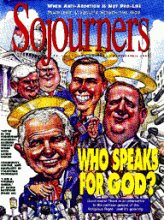Quentin Tarantino, former video store clerk turned filmmaker, burst onto the film scene in 1992. In fact, one could say he gunned his way onto the screen and took the critics hostage.
Here is the disclaimer: Tarantino's films are not for everyone. They are uncomfortably violent and morally ambiguous. Also they are dark comedies, which one must have an appreciation for.
Tarantino's first film, Reservoir Dogs, which he both wrote and directed, earned critical acclaim. He also received accolades for writing the screenplay for the Tony Scott-directed film True Romance.
His most recent project, Pulp Fiction, garnered similar critical praise and won best film at the 1994 Cannes Film Festival. And while critics have been quick to point out Tarantino's master use of fresh dialogue, dark humor, and bitter irony, they may have missed a subtle message.
The world of Pulp Fiction is violent and dark, but it's a world in which God still gets a chance. There is light to be seen, however dim, if we are willing to look closely enough.
The film centers on Hollywood's criminal underground. There are many characters and much that takes place, but two particular characters encounter significant events that ask us to contemplate the quiet mystery of God.
Butch is an aging prizefighter. His boss, Marsellus Wallace, has paid him to throw a fight. On the night of the fight, Butch doesn't take the dive. Marsellus, angry about having been ripped off, is prepared to "scour the Earth" to find Butch.
The two would probably have never met again had Butch not gone back to his Hollywood apartment to retrieve a gold watch, a family heirloom left to him by his father, who died in a POW camp in Vietnam.
Read the Full Article
